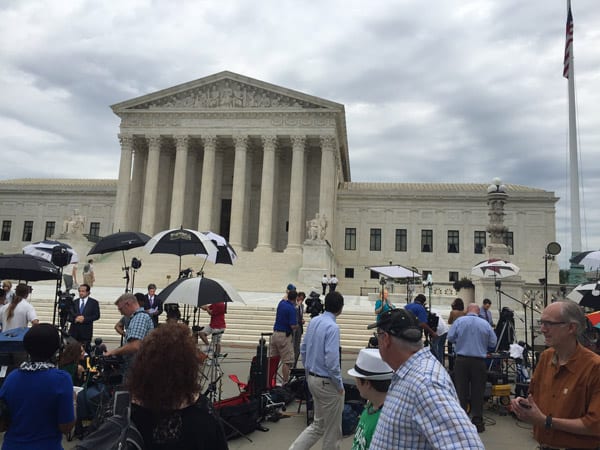The U.S. Supreme Court today (Thursday, June 25) decided two major cases — one on housing and one healthcare — that affect members of the LGBT community. The housing case originated in Dallas.
King v. Burwell (Affordable Care Act subsidies)
While acknowledging in the majority opinion supporting the Affordable Care Act that many passages are poorly written, the decision upholds the subsidies that have allowed millions of people to obtain health insurance. The ruling particularly affects Texas because the suit took aim at states — like Texas — that didn’t create their own health insurance exchanges.
For people with HIV, that coverage has meant being able to see a private doctor and go to a hospital other than Parkland. For AIDS agencies providing direct healthcare, it’s meant a new revenue source and the ability to help more people without insurance.
AIDS Arms, with two medical clinics, has seen an increase in the number of its patients with insurance. Services provided to those same clients previously would have been covered by grants.
Not everyone is happy with the Supreme Court’s rulings.
“This is unfortunate news for the millions of Americans who have experienced first-hand the devastating effects Obamacare has had on their families and businesses,” Texas Attorney General Ken Paxton said. “While today’s ruling is disappointing, Obamacare remains one of the broadest overreaches of federal authority in our nation’s history and we must continue to call on our leaders in Washington to step up and put an end to this job-killing law.”
The job-killing Paxton was referring to is that 2014, the first year of implementation of the ACA was the strongest year for job-creation since the 1990s.
State Rep. Chris Turner, D-Arlington, said, “The impact of a different decision would have been devastating” and would have affected insurance for about 830,000 Texans.
Rep. Marc Veasey, D-Fort Worth, said, “Now that this ruling has been cemented in stone by the highest court of the land, it is my hope that House Republicans can finally move past their partisan obsession with obstructing and dismantling the Affordable Care Act and begin to work with House Democrats on responsible and bipartisan efforts to lower health care costs, create jobs, and strengthen our economy.”
Republican presidential candidate Rick Santorum weighed in as well.
“Today’s ruling by the Supreme Court is yet another reminder that if we are to rid our nation Obamacare once and for all, we need to elected [sic] a conservative President prepared to lead on day one.”
Texas Department of Housing and Community Affairs v. The Inclusive Communities Project (disparate impact and the Fair Housing Act)
The second case upheld the Fair Housing Act of 1968. Attorney Mike Daniel, former husband of County Commissioner Theresa Daniel, represented Dallas’ Inclusive Communities Project, and prevailed in the U.S. Supreme Court.
The decision allows the Dallas nonprofit to sue for discrimination, even if the bias wasn’t intentional. Money for housing projects usually went to Dallas’ poorest neighborhoods rather than placing low-income housing throughout the city. That could affect plans for Dallas Housing Authority’s largest project slated for Kings Road between Maple Avenue and Cedar Springs Road.
However, the decision affects housing across the country.
“Disparate impact claims under the Fair Housing Act are key to addressing systemic housing discrimination and segregation in the United States, including against LGBT people,” said Human Rights Campaign Legal Director Sarah Warbelow. “As the LGBT community seeks to gain explicit protections from discrimination based on sexual orientation and gender identity in housing, this decision from the court is welcome news and reinforces this important tool for addressing housing discrimination.”
“We are elated that the U.S. Supreme Court protected health insurance for millions and reinforced the importance of rooting out discrimination in housing,” said Kate Kendall, National Center for Lesbian Rights executive director. “These two rulings reaffirm the most basic principles of equality, access, and fair dealing.”
Supreme Court rulings benefit the LGBT community

















